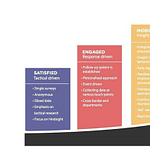It’s well-established that a significant part of employee engagement is about giving employees a voice. After all, as MacLeod and Clarke reported in Engaging for Success: “Employee engagement strategies enable people to be the best they can at work, recognising that this can happen only if they feel respected, involved, heard, well led and valued by those they work for and with.”
However, sometimes employers can neglect the fact that engagement is a two-way process.
If employee engagement is to lead to a highly motivated workforce who truly care about giving their best for their colleagues and customers, surely the same level of engagement should be expected from their managers?
Once the results of an employee engagement survey are received, it’s up to managers to act on the results and give meaningful feedback to employees. There are practical steps managers can take in their day-to-day routine to make this happen and see a change in the culture of a workplace.
Here, we build on the advice given by LinkedIn CEO Jeff Weiner, who tweeted the following:
“Inspire, empower, listen and appreciate. Practicing any one of these can improve employee engagement; mastering all four can change the game.”
With a 97% approval rating from his employees on Glassdoor, his advice certainly seems worth listening to.
Inspire
People are inspired by actions rather than positions. This means that a manager needs to show employees that they deserve their respect, instead of expecting them to be impressed by their status or job title.
Managers should be willing to help employees with a problem, and emphasise that they’re available to coach and develop employees rather than just punishing them should they make a mistake.
Showing enthusiasm towards the company’s aims and objectives is also important. Believing in what the organisation is trying to do will be infectious, and show employees that the move towards engagement is more than just a ‘flash in the pan’.
Empower
Giving employees the tools to do their job is a major part of employee engagement. With talented employees, managers should be able to trust them to meet high-level objectives in a way that suits them. The manager should still be on hand to help if needed too.
Allowing flexible or remote working can also bring the best out of employees, once again trusting them to do their job without having to be supervised. It will promote a healthy work-life balance, preventing top performers from feeling they have to look elsewhere to find an employer that accommodates personal needs such as looking after their children or completing a course.
Listen
The manager doesn’t always know best. It always pays to listen to employees, either on the ‘shop floor’ or during one-to-one reviews. There may be a better way of doing a certain job, or an underlying problem within the workplace; the manager would otherwise be unaware if they didn’t listen to what their staff had to say.
The employee engagement survey is a key part of listening, just on a larger scale. However, what employees say should be acknowledged and acted upon to avoid it being seen as nothing more than lip-service.
Appreciate
If an employee has done a good job, their manager should be quick to tell them. Not only that, they have to mean it and tell them why they’ve done well. People always perform better if they feel valued, so giving positive reinforcement for achieving goals should be part of a workplace’s culture.
Recognising an employee’s potential will also motivate them further. An employee will always be inspired to do their best if their manager acknowledges their career plans, and doesn’t just see them as someone who’ll be satisfied doing the same job indefinitely.
Weiner’s four points seem to be working for him. As one employee on Glassdoor says: “LinkedIn truly is an incredible place to work. You feel valued, you are treated with respect, and are given independence… I feel lucky to work here every day. Come in when you want, do your work, and leave. Except you won’t want to leave.”
David Ralph, Deminos HR
Photo by rawpixel on Unsplash




